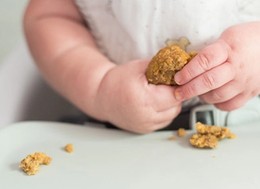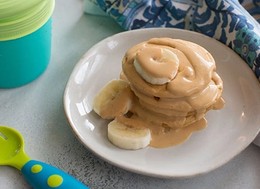Parents of Infants

Starting solids is another step in the adventure of babyhood and the first step toward raising an adventurous eater. With this milestone comes the importance of preventing food allergies by introducing common allergens, like peanut foods. Early introduction of peanut foods is an evidence-based method that may prevent peanut allergies and is recommended by the American Academy of Pediatrics, the Dietary Guidelines for Americans, and food allergy experts.
By feeding small amounts of peanut foods to infants at the right stage of their development – typically around 4-6 months of age – you can prevent peanut allergies and the burden they bring families. As a parent of a newborn, you already have a lot on your plate but delaying the introduction of peanut foods can increase the risk of developing peanut allergies and worsen the management of care if an allergy is present. That’s why the National Peanut Board and partners have assembled these tips, resources and answers to common questions to help you have the knowledge and confidence to introduce peanut foods early and often.
5 Easy Ways to Introduce Peanut Foods

1. Mix with water, formula or breast milk
Thin 2 tsp. of peanut butter with 2-3 tsp. hot water, formula or breast milk. Allow to cool before serving.

2. Mix with food
Blend 2 tsp. of peanut butter into 2-3 tbsp. of foods like infant cereal, applesauce, yogurt (if already tolerating dairy), pureed chicken or tofu.

3. Mix with produce
Stir in 2 tsp. of powdered peanut butter into 2 tbsp. of previously tolerated pureed fruits or vegetables.

4. Peanut Snacks
Give your baby a peanut-containing teething food, such as peanut puffs.

5. Teething biscuits
Teething infants who are older and self-feeding may enjoy homemade peanut butter teething biscuits.
Remember:
- The recommended way to introduce baby-friendly peanut foods depends on whether your child is at high risk of developing a peanut allergy.
- Understand the symptoms of an allergic reaction and what to do.
For high-risk infants, the guidelines advise 2g of peanut protein at any meal or snack, three times per week. - Depending on your child’s risk, peanut foods should be introduced according to these guidelines after they’ve already started other solid foods.
Whole nuts should not be given to children under 5 years of age. - Do not give peanut butter from a spoon or in lumps/dollops to children under 4 years of age.
- Do not add peanut butter or peanut powder to a bottle. Always spoon-feed mixture to prevent choking.
Recipe Suggestions
These recipes are perfect for infants once peanuts have been successfully introduced.
Parent of an Older Child? Learn More Here.
Have an older child? Find out more about adventurous eating through every stage of life.
Parents of Children
The Plushie
Learn more about Little Peanut.




